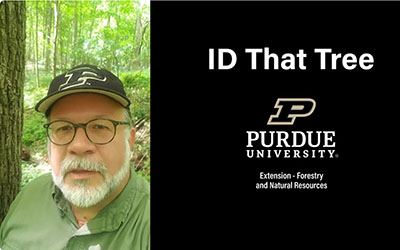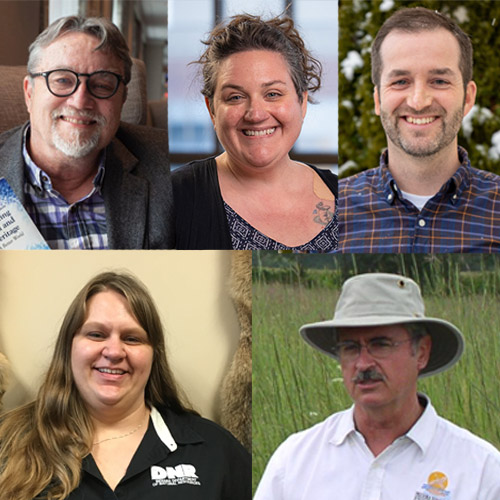Alumnus Nathan Lutz Continues to Evolve in Career
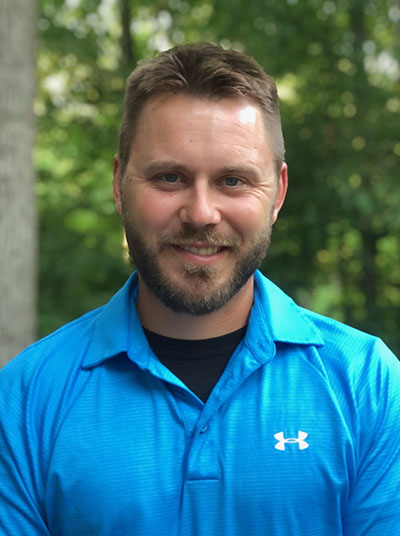 Nathan Lutz grew up just down the road from Purdue in Park County, Indiana, near Turkey Run State Park. Once he made his way to West Lafayette, he spent his freshman year in the College of Engineering, before finding that it wasn’t really what he was looking for or something that he would enjoy doing as a career.
Nathan Lutz grew up just down the road from Purdue in Park County, Indiana, near Turkey Run State Park. Once he made his way to West Lafayette, he spent his freshman year in the College of Engineering, before finding that it wasn’t really what he was looking for or something that he would enjoy doing as a career.
“After that, when I got to looking into options Purdue had to offer, I kind of drifted over to FNR,” Lutz recalled. “My passion has always been the outdoors. I’m a big hunting, fishing and hiking type of person, and to have the ability to look for a job that surrounded me with people like myself and also allowed me to be out in those types of areas was exciting. I was very interested in the nature of the coursework the FNR classes and curriculum had. I found learning about different animal species and tree species to be very exciting and fascinating.”
Lutz switched his major to wildlife, but even still found it hard to believe a career in natural resources was a real option.
“When I was in college, I struggled with thinking that I'd find a career that would allow me to live and do the things that I enjoy doing and have the time and the resources to go do that, while at the same time maintaining a job in a field that I'd be interested in,” Lutz shared. “I thought I'd have to give up one or the other. I would have to go work somewhere that I didn't really enjoy, at a factory or something, to have the resources to have my leisure time, or that I would have to take a not very, financially beneficial job in order to enjoy the outdoors.
“Knowing what I know now, people shouldn't be worried about having to make that choice. If you really enjoy being outdoors and you enjoy learning about those type of things, and you want a career in that, those careers are available and will be becoming more available in the immediate future. There's a huge market in this country for restoration, especially on a large scale, and it's going to continue to become that way due to the way some of the political administrations have gone and other things like that. There are going to be opportunities for people to go out and have those jobs that they're going to find rewarding, and they're going to be able to live off that.”
 While he continued his studies in Forestry and Natural Resources, Lutz picked up a job as a night security officer for the Indiana Department of Natural Resources in the State Parks Division beginning his sophomore year. Lutz worked at Prophetstown State Park, which is also the Region 3 headquarters for the Indiana Department of Conservation.
While he continued his studies in Forestry and Natural Resources, Lutz picked up a job as a night security officer for the Indiana Department of Natural Resources in the State Parks Division beginning his sophomore year. Lutz worked at Prophetstown State Park, which is also the Region 3 headquarters for the Indiana Department of Conservation.
“At that point in my life, I’d already gotten to know a couple of the conservation officers there,” Lutz said. “I’d done some ride alongs and I had made the decision that that’s where I was going to go in the way of a job. Getting a degree in wildlife seemed to go hand in hand with that from an education standpoint. Conservation officers were required to have at least an associate’s degree at that point and I wanted to finish my college education. I thought, what better could I do than getting a wildlife degree when I would be going to actively patrol and enforce state laws that had to do with wildlife.”
The fall semester of his senior year, Lutz began the long, in-depth and demanding process of applying to be a state conservation officer.
“By the beginning of second semester, I had already advanced far enough through the process that I had to make the decision on whether I was going to go to their recruit school, which would have started in February of 2014, or finish my college education,” Lutz explained. “And so I went ahead and pulled out of my spring semester courses, and pursued that career with the state conservation officers.”
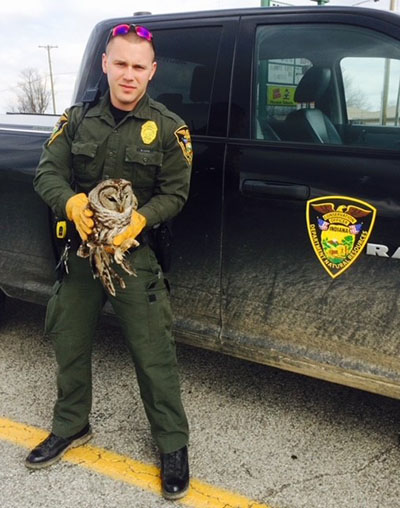 But even after being hired on as a conservation officer, Lutz never gave up the urge to complete what he had started at Purdue.
But even after being hired on as a conservation officer, Lutz never gave up the urge to complete what he had started at Purdue.
“I'd been a state conservation officer for a couple of years at that point, but I wanted to finish that degree just because I'd put the time and effort into it, and I wanted to have that documentation,” Lutz said. “Julie Pluimer was very helpful in working through what credits I had at the time. I already had a lot of my general ed courses filled up with taking the engineering classes my freshman year, and then moving into FNR. It was a real work around to try to get the rest of everything that I needed, just for the last few credits of that final semester, which is why my final degree ended up being in interdisciplinary agriculture with a minor in wildlife. Simply to make all of that come together while I was still working full time is a real testament to Julie and the other advisors there at Purdue. Purdue has enough opportunities in the majors that they have and the options of what you can study, but they also have the flexibility to work with people at different points in their life, and still get their goals accomplished.”
Although he was unable to come back to campus, Lutz finished his degree in interdisciplinary agriculture in May 2017. With his degree in hand, Lutz continued to work as an Indiana Conservation Officer, a role he served in for seven years, with his home base being in Park County where he grew up. In that role as a state law enforcement agent, specially trained to deal with natural resource law, he was able to apply many of the skills from his FNR coursework.
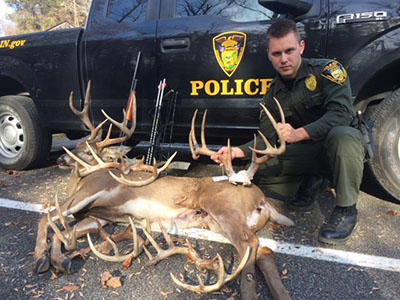 “Working with hunting and fishing laws directly reflected off of my wildlife and biology classes at Purdue when it came to animal ID and animal aging,” Lutz explained. “We also were the primary agency that responds to things like timber theft, so obviously knowing the different types of trees and being able to match up different types of trees from the log that's been stolen to the stump that's still out on the property, was again reinforced from my classes at Purdue and specifically the dendrology classes that I had.”
“Working with hunting and fishing laws directly reflected off of my wildlife and biology classes at Purdue when it came to animal ID and animal aging,” Lutz explained. “We also were the primary agency that responds to things like timber theft, so obviously knowing the different types of trees and being able to match up different types of trees from the log that's been stolen to the stump that's still out on the property, was again reinforced from my classes at Purdue and specifically the dendrology classes that I had.”
In addition to his work as a conservation officer, Lutz picked up a side job working for Resource Environmental Solutions, or RES. The company, originally based out of Texas and Louisiana, was expanding nationwide and had begun making an entry into the Midwest markets for industrial grade restoration. One of the first properties they bought as an asset for a credit-based system was in Hillsdale, which was right across the river from where Lutz lived and also a part of his regular patrol area as a conservation officer.
What began as Lutz and a fellow officer keeping track of the property part time, ended up offering a full-time career opportunity down the road.
“Because they were just kind of in and out of the property at the time, they hired us on a part-time basis to do some basic maintenance or invasive species control work, removing honeysuckle from the property and other things they needed for the management of that property to make it hit the criteria for their bat mitigation work,” Lutz said. “They were doing a bunch of bat studies at the time for the Indiana Brown bat. That escalated over a couple of years to them offering me a variety of full-time positions, and it got to the point that they finally just offered me something like that I couldn’t refuse. I started working in a construction administrator role, doing some paperwork for their operations, and since have moved up, and I am now the operations manager for their projects in Indiana, Illinois, and Missouri.”
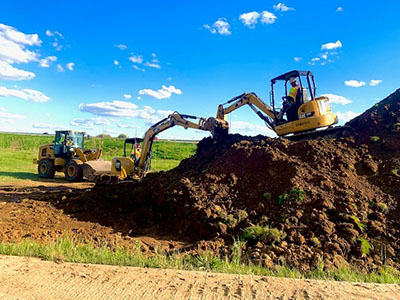 In the south, RES’s primary focus is stream bed restoration, working from the Gulf of Mexico northward, rebuilding habitat and re-running stream beds, especially with the movement of agricultural herbicides and fertilizer moving into the Mississippi River. In the Midwest, a lot of the company’s work originally was focused on Indiana brown bat mitigation areas.
In the south, RES’s primary focus is stream bed restoration, working from the Gulf of Mexico northward, rebuilding habitat and re-running stream beds, especially with the movement of agricultural herbicides and fertilizer moving into the Mississippi River. In the Midwest, a lot of the company’s work originally was focused on Indiana brown bat mitigation areas.
“When the wind farms were coming to central Illinois and northern Indiana, RES was setting up the properties for the credit system that they needed for the habitat for the Indiana Brown Bat, and some of their roosting areas here in Indiana,” Lutz explained. “But now a lot of the work that I'm doing and my crews are doing, is establishing erosion control and native grasses underneath solar farms as solar farms become more prevalent in Indiana and in Illinois. We're essentially establishing a short stature prairie underneath these 1500 to 4000-acre solar farms to rebuild soil composition. A substantial amount of that acreage also is going into pollinator programs. From the operation side we're doing the real work of actually shaping this after contracts are signed and the projects come from the concept to fruition.”
The career change has allowed Lutz to delve deeper into his knowledge from his time in FNR.
“We try to grow a lot of the native trees in-house for the tree plantings that we do on NRCS projects or on these bat mitigation sites, so all those dendrology skills come into play there as I have supervisory status of 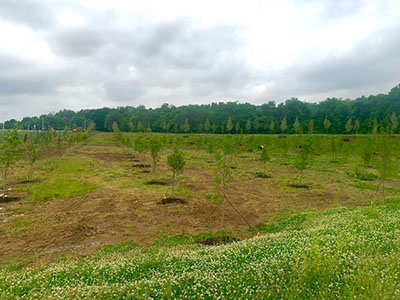 a nursery,” Lutz said. “I also use all of the plant identification for the grasses that we are establishing, in recognizing what weed structures are going to be noxious or detrimental to what we're trying to design, dealing with invasive species control such as autumn olive, honeysuckle and phragmites removal, and also developing the ideal habitat for the Indiana Brown Bat and other endangered species as we develop the landscape.”
a nursery,” Lutz said. “I also use all of the plant identification for the grasses that we are establishing, in recognizing what weed structures are going to be noxious or detrimental to what we're trying to design, dealing with invasive species control such as autumn olive, honeysuckle and phragmites removal, and also developing the ideal habitat for the Indiana Brown Bat and other endangered species as we develop the landscape.”
In offering advice to current and future students, Lutz says it is a mix of experiences and soft skills that are key in the professional world.
“Summer Practicum in Michigan was a very memorable trip that some of my college friends and I still talk a lot about and share memories of, because it was very helpful gaining the hands-on experience and also doing everything else that we enjoyed, not necessarily in the classroom,” Lutz explained. “If you can have those hard skills with the restoration and the plant ID, and you can communicate with clients at both a personal and group level, that is a tremendous asset in this job market. With that, the ability to be self-reliant, and not have to be micromanaged or have everyone else doing things for you, is important. When you’re working in any kind of field that gets you outdoors, you're not going to be around a lot of people, and you need to be able to manage your time and your resources.”
Although his road to his degree and current role were untraditional, Lutz says that isn’t seen as a setback in the career world.
“A lot of what employers are looking for is the fact that people are willing to work for that degree or that goal, and that they are willing to go forward and achieve it,” Lutz shared. “So, even if it doesn't follow the exact layout that you, as a student, expected, it's still going to get you to that goal, and it's going to make you attractive to that employer. And the flexibility that doing the interdisciplinary ag major allowed me to have was to be able to reach that goal even with the other things that were going on in my life.
“Everything is a learning experience, and everything builds on itself. My experience with working for the state, my experience working for RES and my experience at Purdue, they're all going to continue to grow and develop who I am and help me be ready for that next goal or objective that I find later on in life.”




